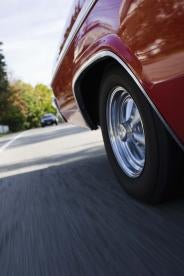In Haeger v. Goodyear Tire & Rubber Co., 793 F.3d 1122 (9th Cir. 2015), the court brought an end to Goodyear’s 20 year effort to hide internal testing documents that revealed problems with its G159 tires when they were installed on motorhomes. Goodyear’s legacy of misdirection, misinformation and outright fraud provides a useful lesson in what not to do and how not to respond during discovery.
In June 2003, plaintiffs were seriously injured when the right front tire on their motorhome failed, causing the vehicle to rollover. The motorhome had been equipped with Goodyear’s G159 tires, a tire that was prone to overheat on RVs when they were operated at high speeds for an extended period of time. After filing suit in 2005, plaintiffs’ counsel sought copies of all internal heat and speed testing data regarding the G159 tires. Goodyear responded by turning over as little as possible and swearing to the court that it had no more. On the first day of trial, plaintiffs settled their case for a relatively modest sum. Within a few months, however, their attorney learned about a significant plaintiff’s verdict in another G159 case, where Goodyear documents were presented which included the internal heat and speed testing data that plaintiffs had sought in their case.
In May 2011, plaintiffs’ counsel filed a motion for sanctions, alleging discovery fraud by Goodyear. Goodyear’s response was that it should not be sanctioned as it never promised to identify or produce “all test records for the G159 tires.” The district court didn’t buy Goodyear’s excuses and, after an evidentiary hearing, found that Goodyear’s national coordinating counsel on the G159 tire cases and its local counsel in the Haeger case had “engaged in repeated and deliberate attempts to frustrate the resolution of this case on the merits.”
The district court concluded that sanctions under either Rule 11 or 28 U.S.C. 1927 were unavailable as the underlying case had already been closed. The court, however, found that it had inherent powers to sanction counsel and parties for bad faith behavior. It imposed a $2.7 million sanction against Goodyear and its outside counsel, an amount that represented all of the attorneys’ fees and costs the plaintiffs had incurred after Goodyear had first responded dishonestly to the plaintiffs’ request for data. The court also ordered Goodyear to file a copy of the Court’s Order in any G159 case initiated after the date of the Order so as to alert other plaintiffs and courts that Goodyear had not acted in good faith in the past when litigating such cases. In July 2015, the Ninth Circuit Court of Appeals adopted the reasoning and findings of the district court and affirmed the district court’s opinion.
There are a number of lessons to be gleaned from the decisions of the district court and court of appeals in the Haeger v. Goodyear case. First, the courts will find a way to exercise their power to sanction improper conduct. Goodyear’s arguments that the court lost jurisdiction after the underlying case settled fell on deaf ears. Further, the courts do not feel constrained to limit relief to monetary sanctions. The court’s prospective sanctions – requiring Goodyear to file a copy of the Order in future G159 cases – has an impact that reaches far beyond the case before the court. The courts have made it clear in any number of recent cases that sanctions for discovery abuses are no longer going to be limited to the case before the court. Finally, in light of other recent cases where discovery sanctions have been ordered, there is no reason to think that the court’s sanctions were entered only because of the intentional bad conduct of Goodyear’s attorneys. Counsel for parties responding to discovery, whether they be in-house, outside or local counsel, must be vigilant in responding accurately and completely to discovery requests. The line between consequences for intentional misconduct and just plain sloppy discovery responses continues to narrow all the time.



 i
i


